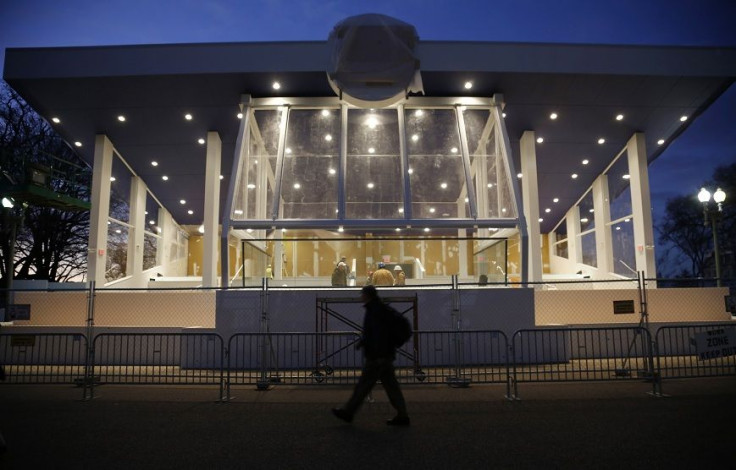Could Inauguration Money Actually Be Funding Obama's Future Presidential Library?

Like everything associated with the 2012 campaign, President Barack Obama’s second-term inauguration is expected to cost a fortune -- or several fortunes.
This year’s Presidential Inaugural Committee, or PIC, is on its way to pulling in record-breaking contributions, after committing to aggressive inaugural fundraising efforts that make 2009 pale in comparison. While there was a ban on corporate sponsors and relatively low cap on contributions for the first event -- Obama reduced the limit to $50,000, down from the $250,000 set by his predecessor, George W. Bush -- the president has now lifted the lid on both. Event planners have been soliciting $1 million donations for VIP packages, according to media reports.
But just what that money will be spent on remains unclear. As has been widely reported, the number of official inaugural balls has been radically downsized, from the 10 that the president and first lady were shuffled to in 2009 to just two in 2013. And yet, the PIC has reportedly set a $50 million fundraising goal this year, up from the $45 million set in 2009.
That year, the Obama team went beyond that goal, bringing in $53.2 million, according to the Boston Globe. Which raises the question: Where is all the extra money raised by the 2013 committee likely to go? The Sunlight Foundation has one idea: Obama’s future presidential library.
Technically, Inaugural Money Doesn't Have To Pay For Inauguration
The presidential library, while an enduring symbol of a commander-in-chief’s legacy, is a fundraising challenge in itself. As of now, there is no foundation in place to raise money for Obama’s library. However, the Chicago Tribune reports the University of Chicago and the University of Hawaii are already competing to host the future presidential center, a project that could cost as much as $500 million.
Obama will be expected to shoulder a higher cost of the project than his predecessors. In 2008, Congress passed a law raising the endowment that a former president’s foundation must contribute to a presidential library from 20 percent of the cost to 60 percent.
The additional funding was requested by the National Archives and Records Administration to reduce the overall financial burden on the federal government. That could explain Obama’s enormous fundraising push.
There are no rules regarding how money raised by presidential inaugural committees must be spent, meaning the options for a surplus are literally limitless. While the 2013 committee, like others before it, must report the names of its donors and their contribution amounts to the Federal Election Commission, this year, that information won’t be available until 90 days after the event. Only donors who gave more than $200 will be reported to the FEC.
It’s a switch from Obama’s first inauguration, when the 2009 committee began disclosing donors and contribution amounts weeks before his swearing-in.
The Obama inaugural committee did not respond to a request for comment regarding how surplus funds may be spent. In a Q&A session with reporters at the National Press Club on Wednesday, Brent Colburn, the team’s communications director, would not specify what the committee would do with a potential surplus, only saying there are “civic-minded things I think we’ll be able to do if we’re lucky enough to have excess funds.”
Colburn would not reveal the estimated total cost of the inauguration.
Taxpayers Forced To Foot Part Of The Bill Either Way
This year’s donor list includes eight corporations, according to the PIC website, such as Microsoft, AT&T and United Therapeutics. The latter is a Maryland-based pharmaceutical company that has been seeking Federal Drug Administration approval for a lung disease medication. In October, after the drug was rejected, Chief Executive Martine Rothblatt said the company was focused on reversing the decision “within the next four years.”
The list’s individual donors include top donors to Democratic super PACs, some of whom contributed millions to the Obama-affiliated Priorities USA, the Center for Responsive Politics reports. Some of the 2012 campaign’s top-tier bundlers -- contributors who assemble large donations from friends and associates once they hit the personal giving limit -- also appear on the list.
But taxpayers are still expected to pick up some of the tab.
Taxpayer money covers the cost of security, emergency services and transportation associated with the event. The inaugural committee is not required to pick up those costs in the event of a fundraising surplus.
The cost could be enormous at a time where Congress continues to battle over the true definition of "fiscal responsibility." Federal, state and local agencies spent roughly $124 million on security, cleanup and other expenses for Obama’s first inauguration. Former President George W. Bush ended up declaring a federal state of emergency as a precaution so additional funds could be requested from the Federal Emergency Management Agency.
© Copyright IBTimes 2024. All rights reserved.





















